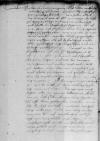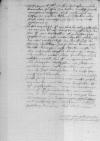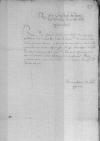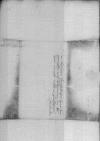Wir haben alless das jennige / so uns E(wer) Er(barkei)t von wegen der lufft zu ⌊Marienburg⌋ / und umb ein andere zeyt und stelle der ⌊thagfarth⌋ zu byttenn(n) / ⌊ko(nigliche)r m(ajeste)t⌋ u(nserem) a(llergnedigsten) hern mit sondrem vleis durch eygenen bothen ⌊⌋. / Was uns aber zu antwurt worden / werden auss eyngelegter copey versthen. / Es yst dy ferlicheyt unser aller gesuntheyt nicht angesehen und unbedacht vorblybenn etc. Dyweyl es dan so gefharen / ist nue zu rhatslagen ab ⌊ko(niglich)e m(ajeste)t⌋ u(nser) a(llergnedigster) her(r) widervmb mit schryfften sey zuersuchen / und mit den vorigen ursachenn umb andere tzeyt und stelle zu bytten / ader aber von uns selbst zeyt und stelle zu setzenn. / Es mussen lewt sein dy unsere sachen am hove wunderlich treyben etc. Ist derwegen unser bedencken / so dy lufft zu ⌊Marienburg⌋ leydlich wer und sicher / das wir uns noch dohin / ader in eynner bekwemer stelle den XV diss zukunfftigen Iunii begeben etc. Sol uffs newe geschryben werden / wurde sich dy zeyt vorloffen / und sant Michels thag[1] ankomen. / Solle wir auch under uns ane ⌊ko(niglich)e m(ajeste)t⌋ wyssenheit und zulass von uns selbst wass setzen (: so der meysteyl unser hendel am hove seltzamer(r) weys gedeut wirt :) mocht uns etwas vorweyslich und zu ungenaden gelangen.  APG 300, 53, 267, p. 44 Was hirynnen E(wer) Er(barkei)t im furderlichsten und bekwemsten zu thun im besten ansehen / wolle wir gerne volgen / auch widerumb ein bothen in unsern kosten zu schicken ader sonst was vonothen zu thun uns nicht besweren etc.
APG 300, 53, 267, p. 44 Was hirynnen E(wer) Er(barkei)t im furderlichsten und bekwemsten zu thun im besten ansehen / wolle wir gerne volgen / auch widerumb ein bothen in unsern kosten zu schicken ader sonst was vonothen zu thun uns nicht besweren etc.
Es hat uns auch ⌊f(urstliche) D(urchlauch)t⌋ vor sant Stanislai[2] ⌊⌋ wy von im ⌊ko(niglich)e m(ajeste)t⌋ durch brive gefurdert / das sein D(urchlauch)t yre botschaffter uff gedachter zeyt ⌊thagfhart⌋ in unser mittel schicken solde / sich das mhal entschuldigt / das sein D(urchlauch)t auch der seynnen dy selbtige zeit zu samen komen het berufft / derwegen nicht schicken mochte. / So aber noch unser ⌊thagfart⌋ etlichen hern rethen aus unserm mittel / solche handlung wurde befolhen / wolde sein D(urchlauch)t in eygner person / ader durch sein botschaffter / mit solchen angesatzten hern lassen handlen / woruff wir dy zeyt antwurtten / das unser thagfarth sant Stanislai von wegen vorgiffter lufft zu ⌊Marienburg⌋ nicht mocht gehalten werden / und das wir der halben ⌊ko(nigliche)r m(ajeste)t⌋ geschryben etc. Was nue weyther hirynne ⌊f(urstlicher) D(urchlauch)t⌋ zu antwurtten wer / wolden uns E(wer) Er(barkei)t belernen / dy wir Got dem almechtigen in langweriger gesuntheit und wolfarth thun befelhen. /
 APG 300, 53, 267, p. 44 Was hirynnen E(wer) Er(barkei)t im furderlichsten und bekwemsten zu thun im besten ansehen / wolle wir gerne volgen / auch widerumb ein bothen in unsern kosten zu schicken ader sonst was vonothen zu thun uns nicht besweren etc.
APG 300, 53, 267, p. 44 Was hirynnen E(wer) Er(barkei)t im furderlichsten und bekwemsten zu thun im besten ansehen / wolle wir gerne volgen / auch widerumb ein bothen in unsern kosten zu schicken ader sonst was vonothen zu thun uns nicht besweren etc.



